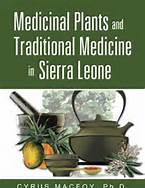Book Review: Medicinal Plants and Traditional Medicine in Sierra Leone
African News, Featured Contributors/Columnists, Latest Headlines Sunday, November 30th, 2014
Title: Medicinal Plants and Traditional Medicine in Sierra Leone
ISBN: 978-4917—0609-1: 978-1-4917-0610-7: 978-14917-0611-4
Publisher: iUniverse LLC
Date published: November 2013
Author: Dr. Cyrus Macfoy
Reviewer: Roland Bankole Marke
I’m hopeful, if not delighted about writing reviews of books written by Sierra Leonean authors that are increasingly making encouraging and steady progress. Though the culture of reading and appreciation for books is yet to grow deep roots in the African community. Certainly, knowledge like culture and traditions must be preserved and passed down to future generations for reference or posterity. My insatiable appetite for reading books authored by Sierra Leoneans is getting interesting and gratifying. There’s a renaissance already in progress. Our folks are taking a stride in the right direction. If we don’t sell our unique culture and traditions to the world showcasing our values as a people, gifted with a reservoir of rich culture, who else would? Others with selfish motives will probably do it for us in a probably skewed or negative light. Dr. Cyrus Macfoy, a renowned professor, researcher and consultant who has served the United Nations, Commonwealth Secretariat, World Bank, and was assigned to various African and European countries, has stormed the world with his book: “Medicinal plants and Traditional Medicine in Sierra Leone.”
 His extensive research with his students spans some thirty-five years of painstaking research, interviewing traditional healers and herbalists, traveling to remote areas in Sierra Leone, West Africa and beyond, trying to discover the priceless wonders of nature in the motherland, and elsewhere in the African continent. This is a very important continent not just rich in precious minerals like gold, diamond or bauxite. Certainly, Africa is richly blessed in ecological endowment that includes: Medicinal plants and traditional medicine. Professor Macfoy writes with confidence and expertise based on his brilliant doctoral background in Ecological Biochemistry, from the Imperial College of Science, Technology and Medicine, University of London, and his tenure as an international scientist. In the US, he taught at the American University, Johns Hopkins University, Trinity University, Montgomery College, and the UMUC and given lectures at GWU and CU. He is also senior Fulbright Award winning scholar and researcher and a Smithsonian Fellow, who was recently interviewed by VOA TV and Radio on his work. This confirms my belief that Africans could perform brilliantly in any chosen field if given a level playing field. Dr. Macfoy is a glaring example of intellectual prowess, and stands tall in academia.
His extensive research with his students spans some thirty-five years of painstaking research, interviewing traditional healers and herbalists, traveling to remote areas in Sierra Leone, West Africa and beyond, trying to discover the priceless wonders of nature in the motherland, and elsewhere in the African continent. This is a very important continent not just rich in precious minerals like gold, diamond or bauxite. Certainly, Africa is richly blessed in ecological endowment that includes: Medicinal plants and traditional medicine. Professor Macfoy writes with confidence and expertise based on his brilliant doctoral background in Ecological Biochemistry, from the Imperial College of Science, Technology and Medicine, University of London, and his tenure as an international scientist. In the US, he taught at the American University, Johns Hopkins University, Trinity University, Montgomery College, and the UMUC and given lectures at GWU and CU. He is also senior Fulbright Award winning scholar and researcher and a Smithsonian Fellow, who was recently interviewed by VOA TV and Radio on his work. This confirms my belief that Africans could perform brilliantly in any chosen field if given a level playing field. Dr. Macfoy is a glaring example of intellectual prowess, and stands tall in academia.
This book attempts to quench one’s thirst for medicinal plants and traditional medicine, especially in remote African communities, where access to medical facilities or services are scare or don’t exist at all. It could help cure diseases and illnesses that continue to plague our people that often result in premature death. The recent outbreak of the Ebola virus from neighboring Guinea and Liberia to Sierra Leone’s border towns, requires urgency, education and information, to arrest this dreadful emergency from spreading to densely populated towns in this small but closely connected nation. This is an opportunity to take a serious look at medicinal plants and traditional medicine to help find a cost effective prevention strategy, and possibly a lasting cure to the threat of HIV/AIDS and Ebola viruses and other diseases or illnesses. Because of my innate passion to grow organic veggies, medicinal plants and fruits, I find this book an invaluable asset that supports my conviction that eating fresh, healthy veggies will improve our health and help reduce visits made to doctors, for symptoms we could deal with unaided. Despite the book gives legs to medicinal plants and traditional medicine, but it does not claim to become a replacement for the healthcare system of any nation. However, alternative medicine has worked better for some people with less complications or side effects than western medicine.
Moringa oleifera plant is the greatest super food ever. It’s called ‘The tree of life,’ and believed to be originally from India. Herbalists and traditional healers had some knowledge of this plant: but could have concealed such information for fear that competitors might put them out of business by sharing the healing powers of the plant. But other evidence shows that Moringa is native to East Africa, where it is referred to as “Mother’s best friend.” Almost every part of the plant/tree could be used for beneficial purposes. It is loaded with vitamins, minerals, protein, amino acids, antioxidants and bio-nutrients. Promoters believe that the plant’s leaves prevent about 300 diseases. The plant is very popular in SL, Ghana and other African nations. The products from the plant are increasingly sold in health food stores abroad as knowledge of the benefits of the plant increases.
It’s only through collaboration, education and sharing vital information that Africa could take responsibility for its health needs: To ensure a healthy life style for the present and succeeding generations. Nature has endowed us with so much. About time we activate the dynamo in us to champion our own destinies: Rather than play the spectator role, sitting comfortably waiting for aid or handouts coming from abroad. Certainly, we have the wherewithal to navigate a brighter future, we often dream about. Information sharing in Africa should not be seen as a threat to one’s survival. For extensive research benefits everyone and we could collectively harvest the benefit of economy of scale.
Another important tree that’s native to Sierra Leone, South America and South Eastern Asia featured in this book is the Graviola tree, commonly called soursop: The biological name is Annona muricata. The fruit is rich in carbohydrate, vitamin C and vitamins B1 and B2, the fruit, seeds and leaves are used to treat viral and parasitic infections. There is growing claim that soursop could cure cancer. However, there’s inadequate scientific evidence to support this claim as established fact.
Professor Macfoy has written a timely and resourceful book that everyone needs to get a copy of. I’ve harvested from its pages and digested the wonderful information the author so meticulously prepared to benefit us. The book contains more than 200 medicinal plants used to treat more than 100 diseases and illnesses, the socio-cultural aspects of traditional medicine, aspects of the chemistry and biological activity testing, plus the potential to develop new drugs and integration with western medicine, together with conservation issues. I strongly recommend this book. Every institution of learning from high school to college should secure copies for their libraries. Universities and Medical Schools could prescribe it as required reading to stimulate interest in this exciting but challenging virgin domain of Medicinal plants and traditional medicine, deserving a fighting chance, like other areas of investigation or possible research. The book advocates for the inclusion of Medicinal plants and Tradition Medicine in the practice of tropical Medicine in Sierra Leone and other African countries. My library has gained a new addition to its collection and a new friend.
Periodically, I would return to this book for vital information that would add freshness and flavor to my writing as well as guide me on my journey to discover the health benefits of organic plants that I grow. I hope potential readers will find pleasure in doing likewise. For the language is simple and one doesn’t have to be a researcher or scientist, or belong to any discipline in the medical field to benefit from it. Being human and wish to enjoy a long and healthy life to the fullest makes it necessary. It is intended to benefit humanity at all levels. Hopefully, since the book is now available in Sierra Leone, every institution there should have access to the book and the nation’s medical school could adopt it as reading text for its programs to help in promoting tropical medicine. For most of the plants are accessible locally. And tropical traditional medicine is not a novelty there, where eighty percent of the people use it by choice or necessity. I’ve derived much pleasure, education and formulated probing questions after reading this book. Hope the reader will feel the same way too. So that we could collectively engage in brainstorming exercise/research that could eventually lead to finding lasting cures for an array of aliments that continue to plague the world and our closely knit African communities. Global justice would be served in deeming it necessary to integrate Medicinal Plants and Traditional Medicine into the healthcare delivery system of Africa and the rest of the world.
Reviewed by Roland Bankole Marke © 2014
To obtain autographed copies of the book, contact the author directly:
Email: cmacfoy1@verizon.net or phone: 301-921-0030
Related Posts
Short URL: https://www.africanexaminer.com/?p=20066






















